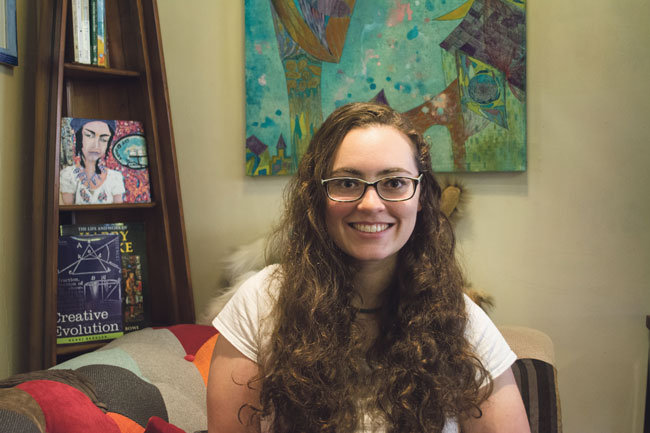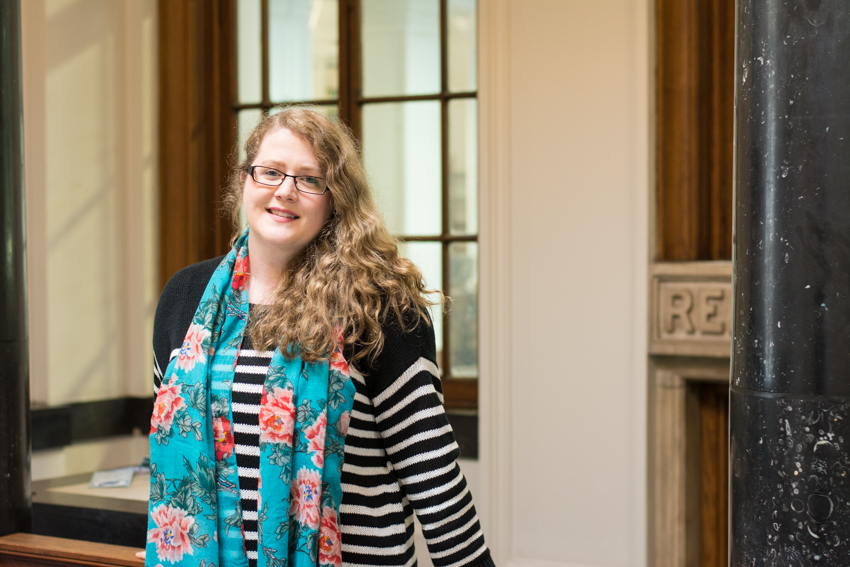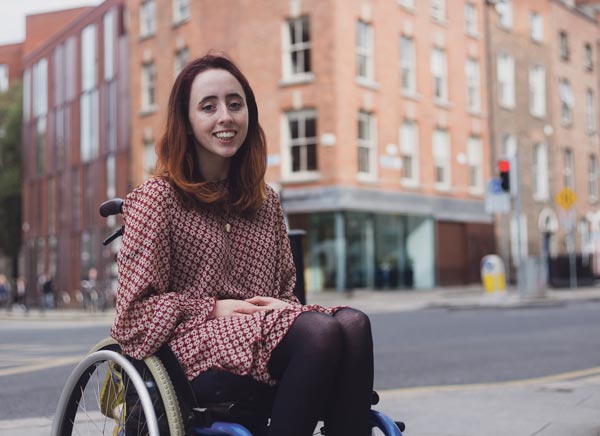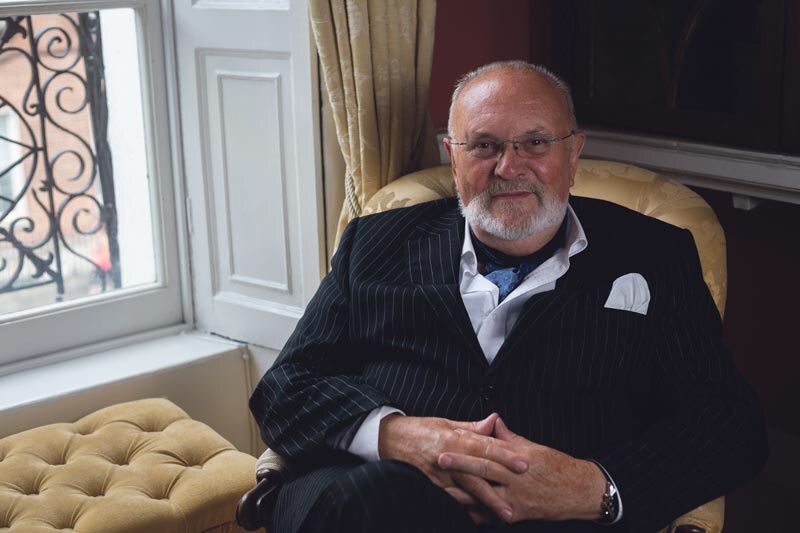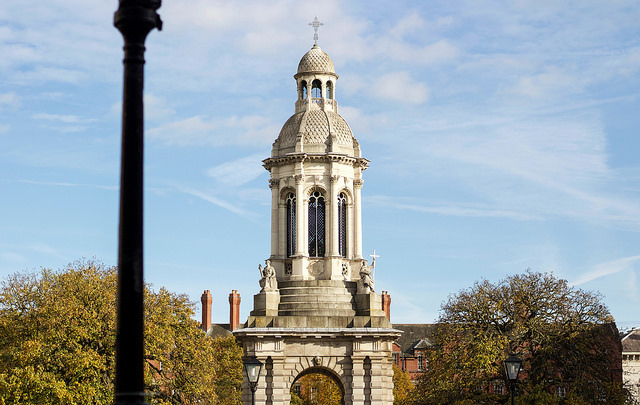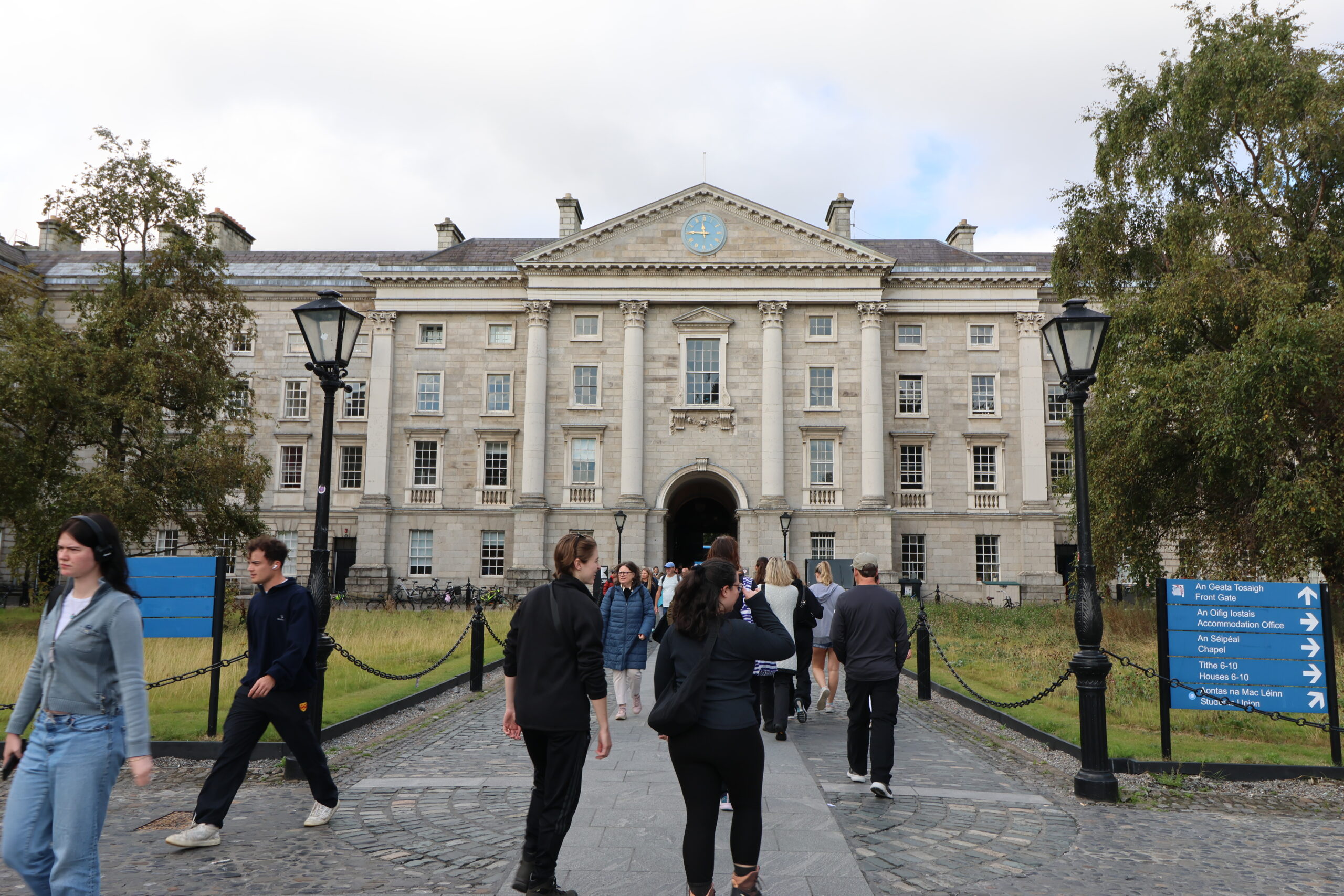As a student, each one of us fits into a category. This is often for administrative purposes. It may be because you’re not from Ireland or because of your age. And although these things don’t often matter once we sit down in the Arts Block or attend our first tutorial, they do contribute to the different experiences we have during our university education.
Such is the case for Zacharias. As a fourth-year medicine student, Zacharias’s college experience will be different from anyone in the arts. As a student parent, her perspective changes once again. And as a mature international student from the US, she fits into numerous and overlapping categories. With stories to tell and some hilarious asides, her experience of Trinity so far, particularly as a fresher, differed from many others that I’ve heard.
I’ve often wondered what a person’s first impression of Ireland is, and Zacharias is able to offer her perspective, initially made up of “a lot of confusion”.Things that we, as Irish people, are accustomed to seemed strange and almost alien to her to Zacharias in her first few weeks in Dublin. Before setting foot in the country a phone call with Trinity admin completely threw her off: “I’d ask a question then they’d answer it and we’d hang up and they’d go ‘bye-bye-bye-bye-bye-bye-bye.’ And I swear I thought that they didn’t like me and couldn’t wait to get me off the phone. And it wasn’t until I got over here that I realized that that’s just how they say goodbye.”
As a nervous student, having moved over without her long-term partner, Andrew, who was to follow, even the shop assistants seemed to know that she was uncomfortable in her new surroundings. Or so she thought: “The same thing happened when I went into a shop and they’d say ‘y’okay?’, and I was like ‘uhhh’. See, I was very nervous as well coming over so I didn’t feel like I was okay so I was like ‘how do they know?!’” The drawl with which Zacharias pronounced “y’okay” certainly demonstrated that she has become almost native in her four years in Dublin.
Once I differentiated living in the city to living in Ireland, I think that really made a difference. I wasn’t upset with Ireland. I was upset with the city
The final decision to uproot their lives in Virginia and move to Dublin was made for a variety of reasons: “I wanted to live abroad. Andrew really wanted to live abroad. I also wanted to live abroad with Andrew. He also wanted to try living in a city. If I went to Trinity, I would knock off going to med school, a very good med school. He – we – would get to knock off living abroad and he would get to knock off living in a city.”
But once she arrived in Dublin the illusion of Ireland being an idyllic and serene shattered: “Sometimes the city can be a bit ugh. The Luas is crazy and … I’m just not a city person. And once I differentiated living in the city to living in Ireland, I think that really made a difference. I wasn’t upset with Ireland. I was upset with the city.” Even as an Irish person, I can relate to just how “ugh” Dublin can be sometimes.
The city may have been new but being an undergraduate freshman was not. As a previous French language and literature major in the University of Virginia, arriving as a first-year medicine student in Trinity was still daunting: “Meeting 180 other people, as well who you were going to be with for the next five years, was pretty crazy to think about.” As daunting as the prospect was, Zacharias decided to jump right into the deep end and become a class rep: “I felt lost and I was like: ‘If I feel this, lost surely other people might feel the same.’ I thought it was a good thing to see how I could help.”
There was also a sense of reward in representing her new peers: “If you can make someone else’s life easier, it’s rewarding.” Upon receiving a standing ovation for her work as a class rep at an impromptu class awards ceremony she summed up the moment: “It felt really good because, on my first day in Ireland, I cried.”
Sometimes as mature students we kind of forget about the fact that college is also supposed to be a fun time before you’re a slave to your job. I honestly don’t think us mature students would do that much without the younger cohorts
When we speak about being a mature student on top of being an international student, she quickly chimes in: “I mean, I’m a mature international student, and I think that’s a big thing. But some of [my classmates] are mature international students who are working now or we’ve had graduate medical entry, like dentists, who are actively practicing now as well. There are people who are doing even more than myself.” Although she realises the importance of bonding with other mature students, she says that it is even more important to bond with younger classmates: “The younger peers will actually help you to have fun – as weird as that sounds.” A smile spreads across her face: “Sometimes as mature students we kind of forget about the fact that college is also supposed to be a fun time before you’re a slave to your job. I honestly don’t think us mature students would do that much without the younger cohorts.” A smile and a giggle follows as she quips: “Plus, they keep you young. You know, you have to keep up your drinking game.”
During her second year something else apart from studying became a focus for her. This little distraction goes by the name of Sophie, Zacharias and her husband’s one-year-old daughter. As she prepared to become a first-time mother during her second year in Trinity, she did not prepare quite as well for the practicalities and logistics of breastfeeding during her third year. Sophie was born during the summer but was still very small as Zacharias entered her third year of college. Breastfeeding is not common in Ireland but this was not an issue for her who matter of factly states: “I always knew I was going to do it.”
When it came to term time, and particularly placements in different hospitals, the fact that Zacharias breastfed Sophie became slightly more problematic. She remarks that she “didn’t sort out the logistics”. Sophie was only a few months old, so Zacharias had to pump regularly. Facilities for pumping in the hospitals she was on placement in were not readily available. When looking for a room to pump in, she was sent from person to person in order to find a room that was free and was not a toilet. “At the sixth person I cried. She was a midwife previously, so I think she was quite sensitive.” At this point she was given security access to the on-call rooms that doctors use at night. Reflecting on the problems that she had looking to find a space to pump, she states that “once I realized I just had to voice my concerns and my needs, I found that there were people who wanted to support me. That made it easier then, because in the beginning if I couldn’t find a nook or cranny I had to go home. Physiologically, I couldn’t last a whole day with her being that small.”
Zacharias informs me that the La Leche League of Ireland, the breastfeeding help and information service, has just started in Trinity and holds coffee mornings. “It is possible. I think the biggest part is planning. Also just making sure you speak up for yourself because there will be other women who probably want the same or already do and you just don’t know that they’re there,” is the response she gives when I asked whether or not having a child and breastfeeding them was possible during college. “You need a good support system, a lot of hard work and you need a little bit of stubbornness. So I think that one part of being an American worked out.” Her lips curl into a smile, almost a smirk, as she finishes that sentence. “You will find supportive people it’s just, you know, they’re not wearing a badge.”
Zacharias knows of other student parents with young children and believes that if she had not been breastfeeding and on placement it would have been much easier to manage a young baby as a student. If you become a parent during college, she concludes that it is manageable. But it is important to know “whether or not you can make some sacrifices. So, you know, sleep isn’t always the best. Coming up to an exam I might have 10 hours worth of study that I know I have left to get done, and if Sophie gets sick I know I only have four hours so you kind of have to live with it and make the most of the four hours. You will get by, I have gotten by. I’ve not had to take a single supplemental. I think if I can do it, anyone can.”
The thing with a lot of medicine students is that we are very tight-knit and that’s kind of how you’re raised from year one. You know your classes are 8am to 5pm
As a student parent, Zacharias decides to spend her spare time away from medicine and societies in college as she often chooses to go to parent and baby activities instead. As a first year, without a child, she concentrated a lot on studying and doing well in medicine. Although the course is intense and requires a lot of time and effort, it is important to look after yourself: “I spent all my spare time studying. I think, in retrospect, it was good to be cautious in the beginning because I didn’t know. But at the same time it’s important to remember that other things are important too. You need to remember to get good sleep. You need to remember to shower! Cook yourself some nice meals. In first year I went to the gym regularly, and I think the physical exercise really helped.”
Trinity’s health science can sometimes feel separate as they spend so much time off campus, and their days are incredibly structured. Zacharias explains that “you do sometimes feel excluded, but I don’t think it’s an intentional thing. The university consistently tries to help. Anybody going for SU will come to Tallaght and say ‘we’ve not forgotten about you medics’. It’s logistically difficult. We do appreciate the efforts”. In terms of engaging with Trinity’s societies, although she personally did not engage, she believes that it is possible for someone who studies medicine to do so: “If you really want to participate in Trinity life I think you can. The thing with a lot of medicine students is that we are very tight-knit and that’s kind of how you’re raised from year one. You know your classes are 8am to 5pm.” Every course is different, but Zacharias does recognise that perhaps some of her younger cohorts, although they go out on class nights, do engage with Trinity on a larger social scale than she might. She laughs: “But, then again, I’m a mature student, so maybe I just don’t hear about it.”
As we finish our interview, she packs away the piece of cake she bought for Andrew, now her husband. And, with one last grin, she comments: “I always feel like I have advice but when someone asks me to give it I’m like ‘uhhh’.” Her reflections on her three years in college so far say otherwise.
